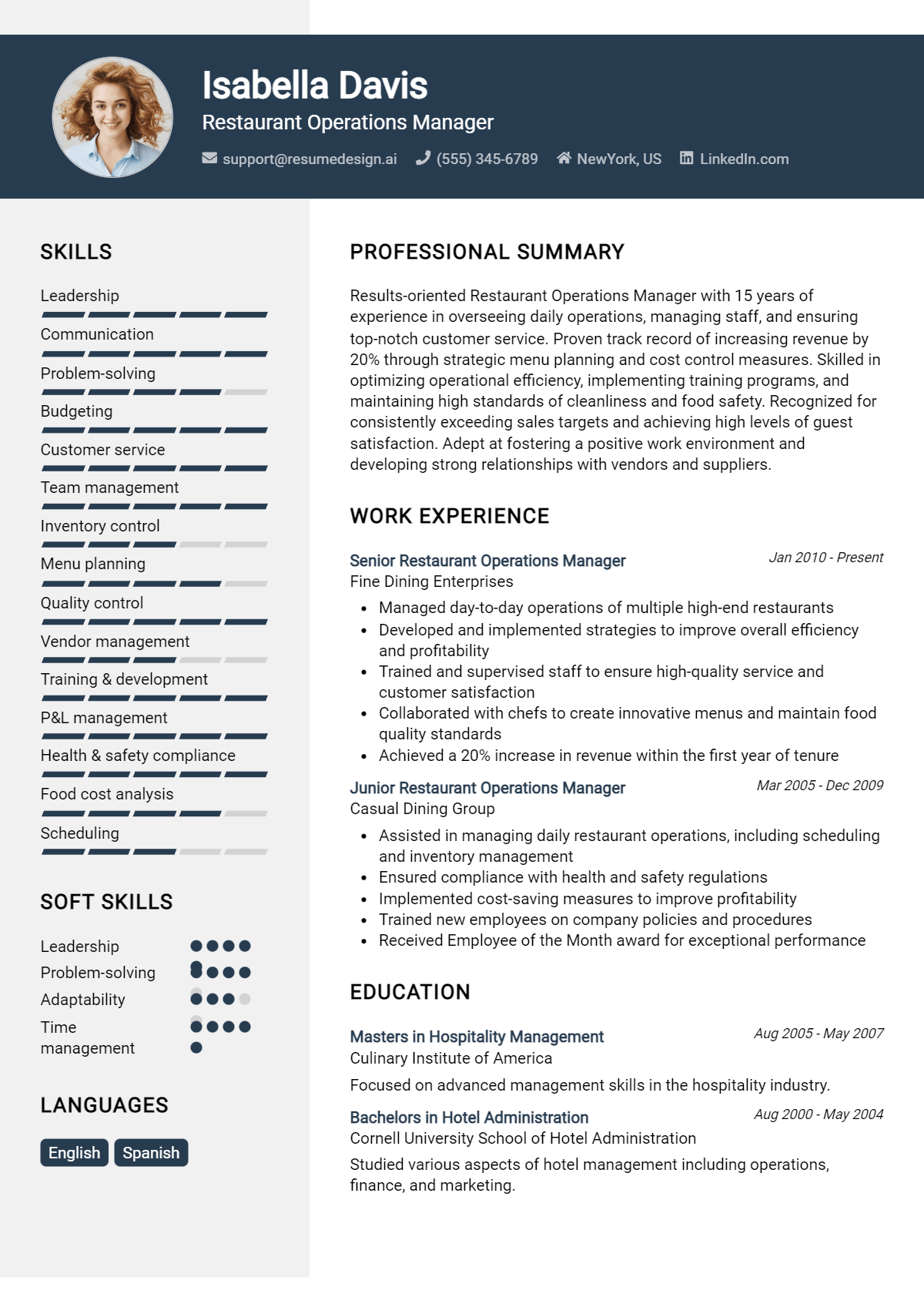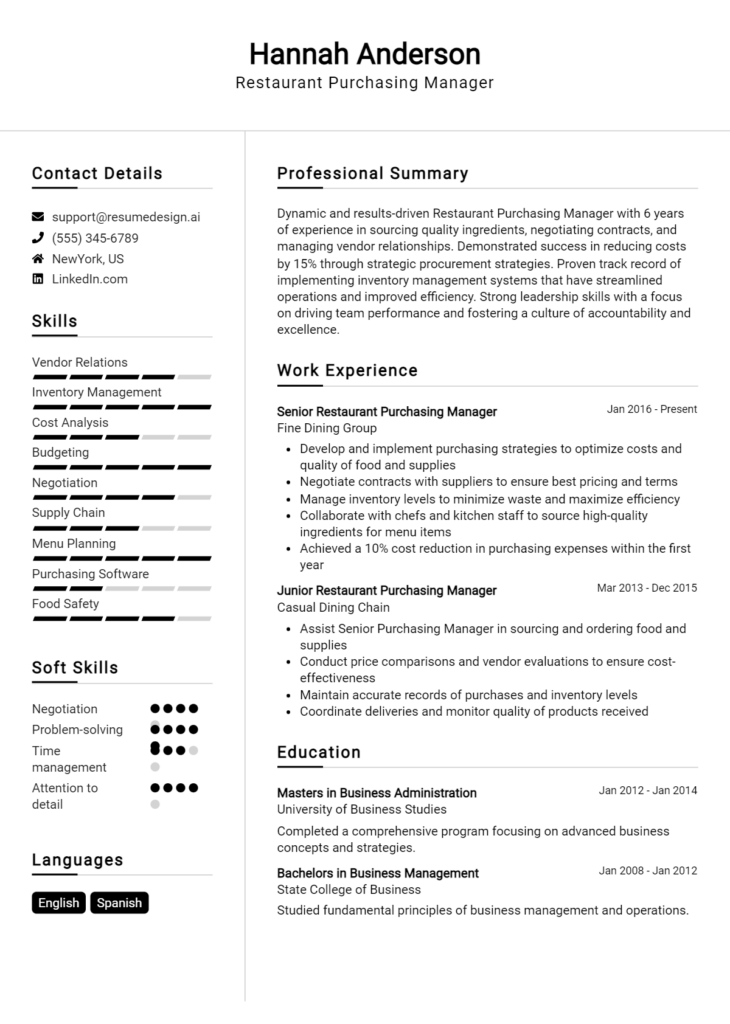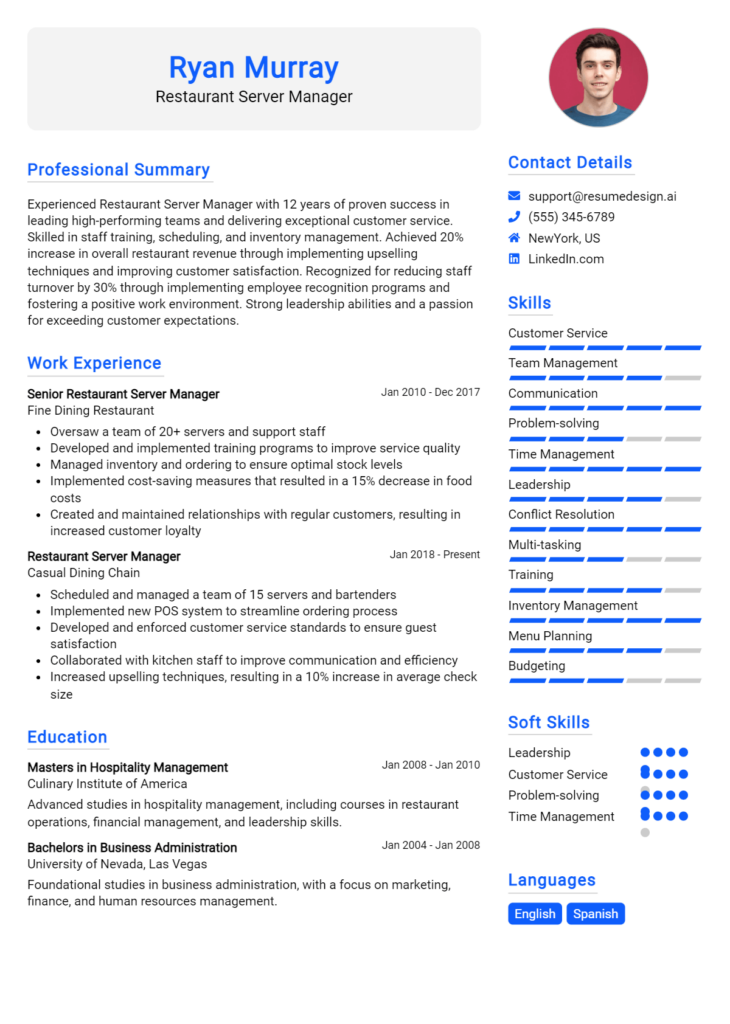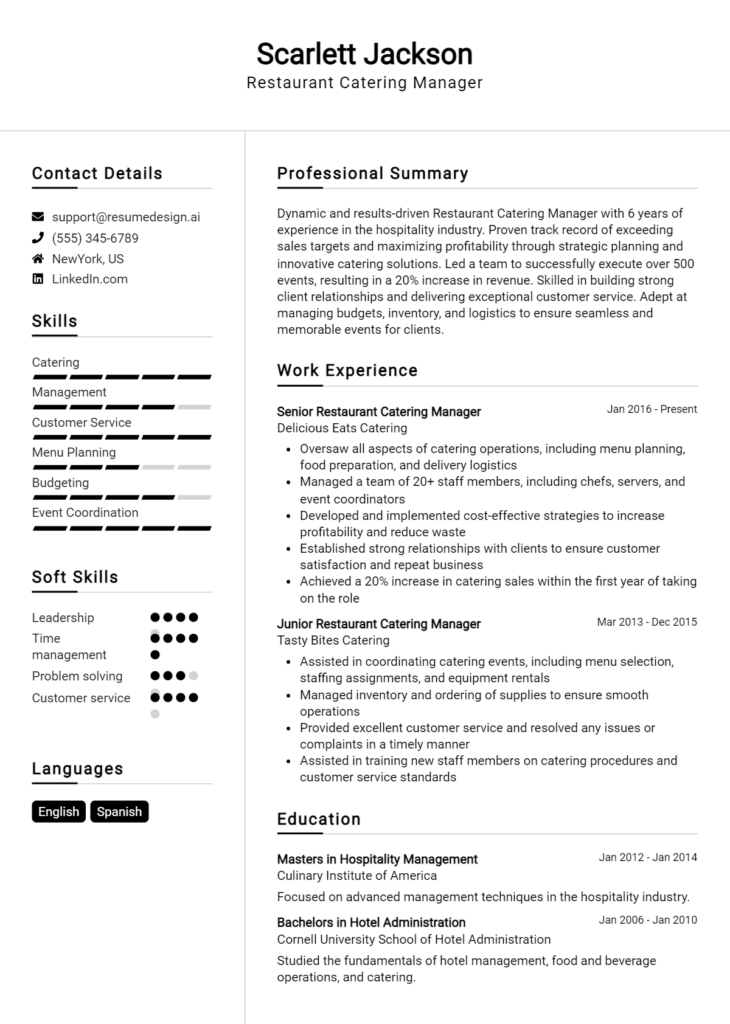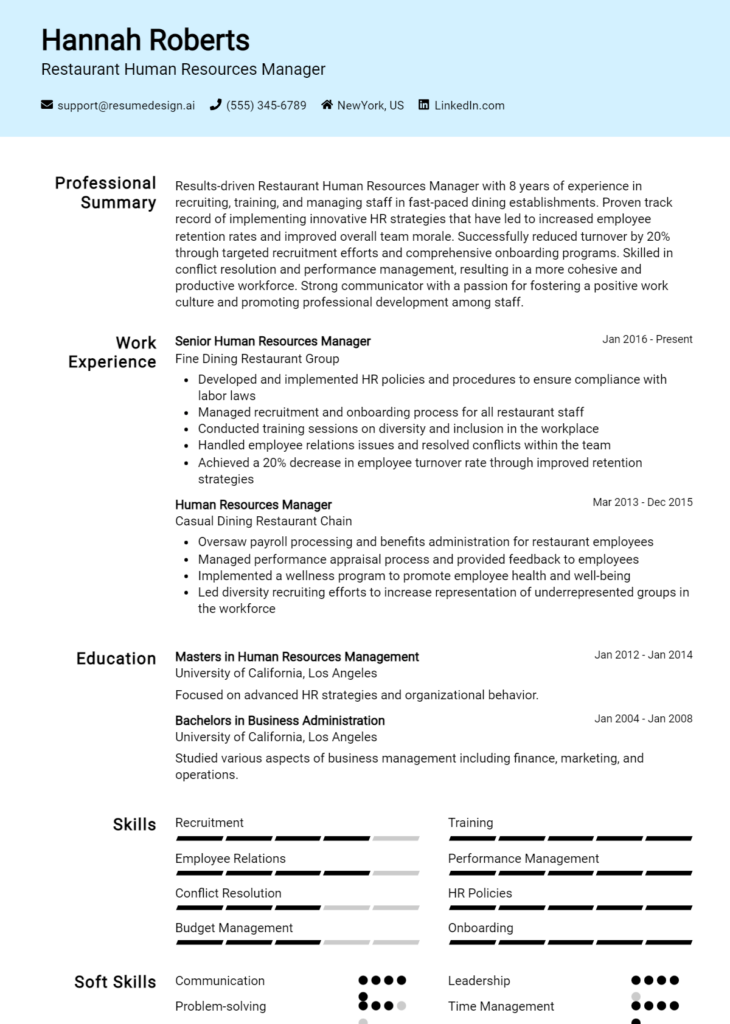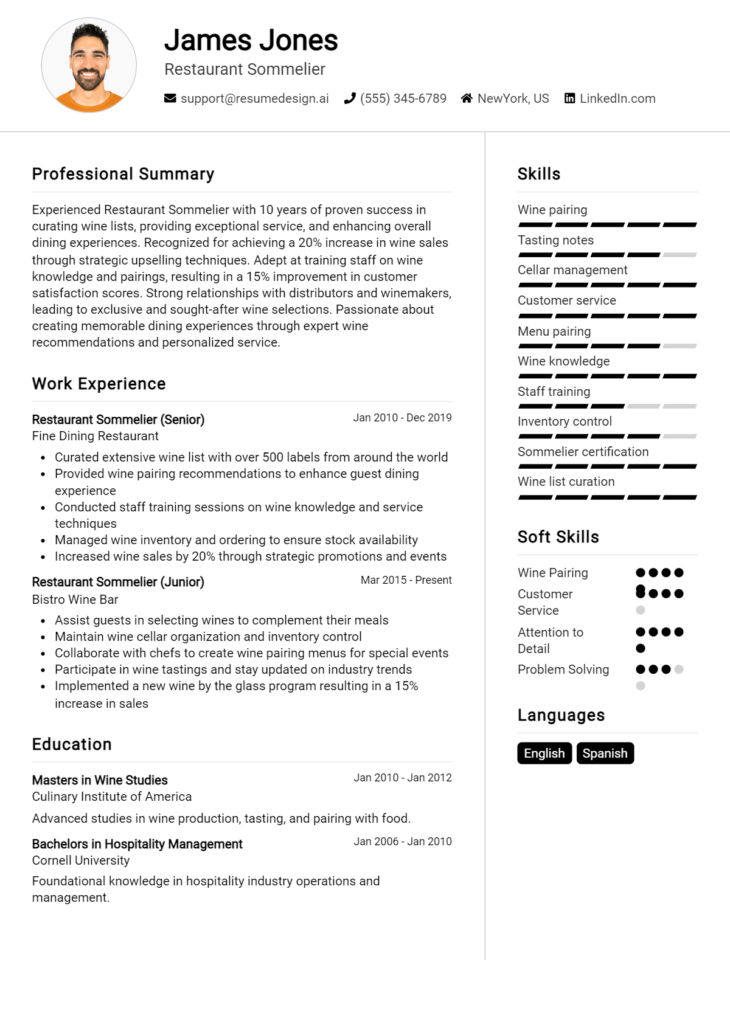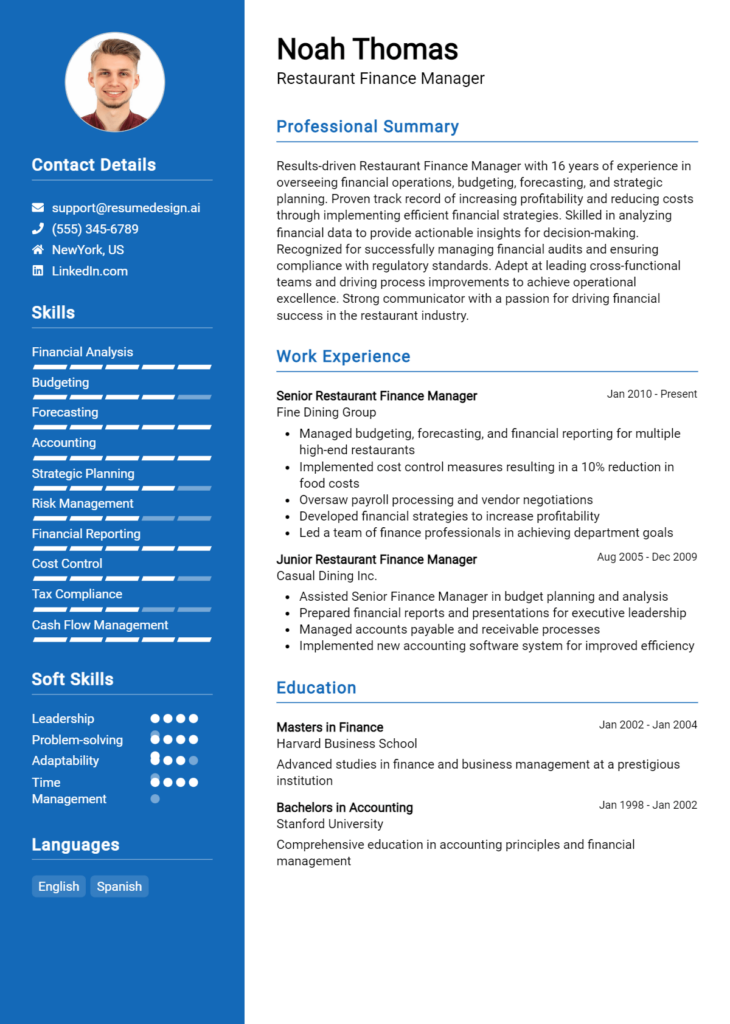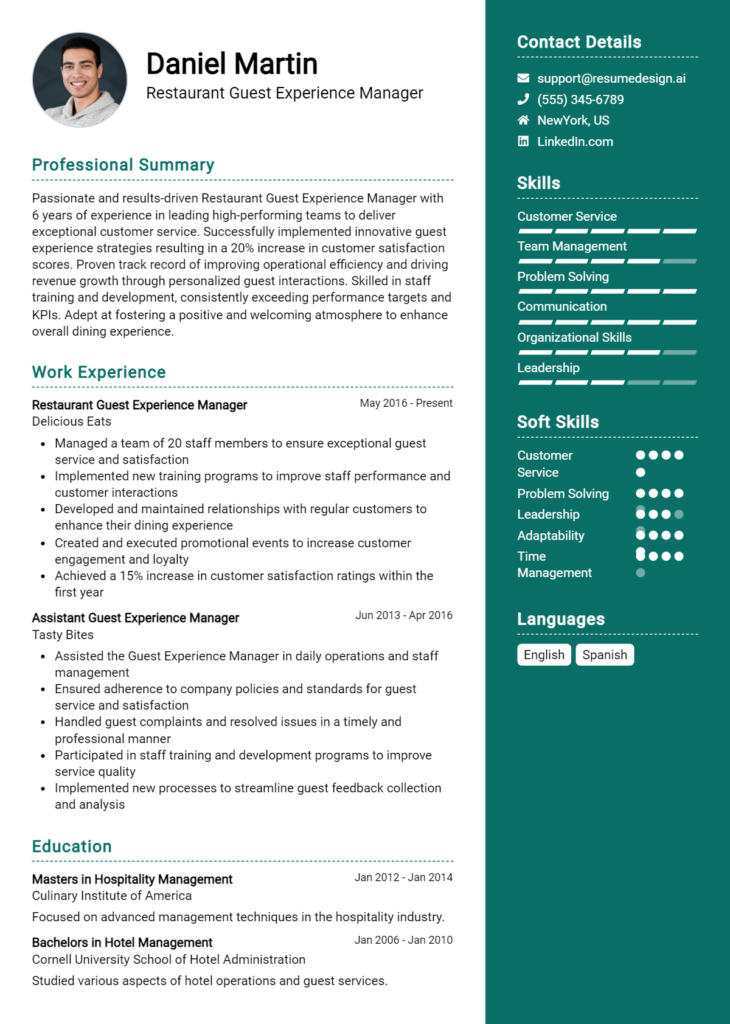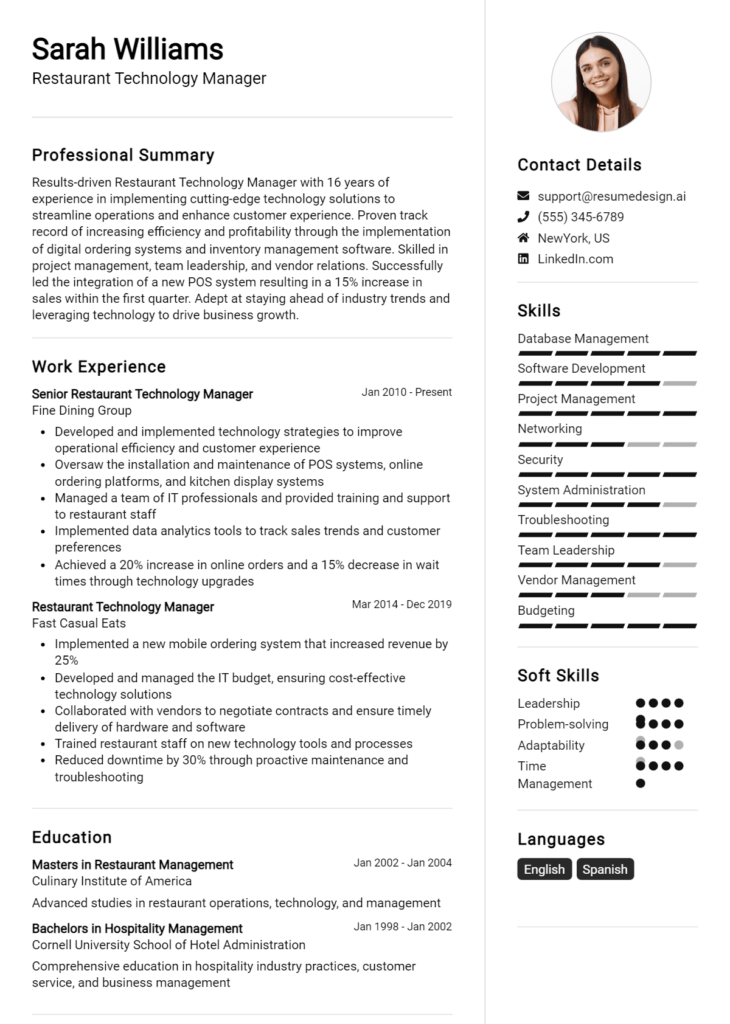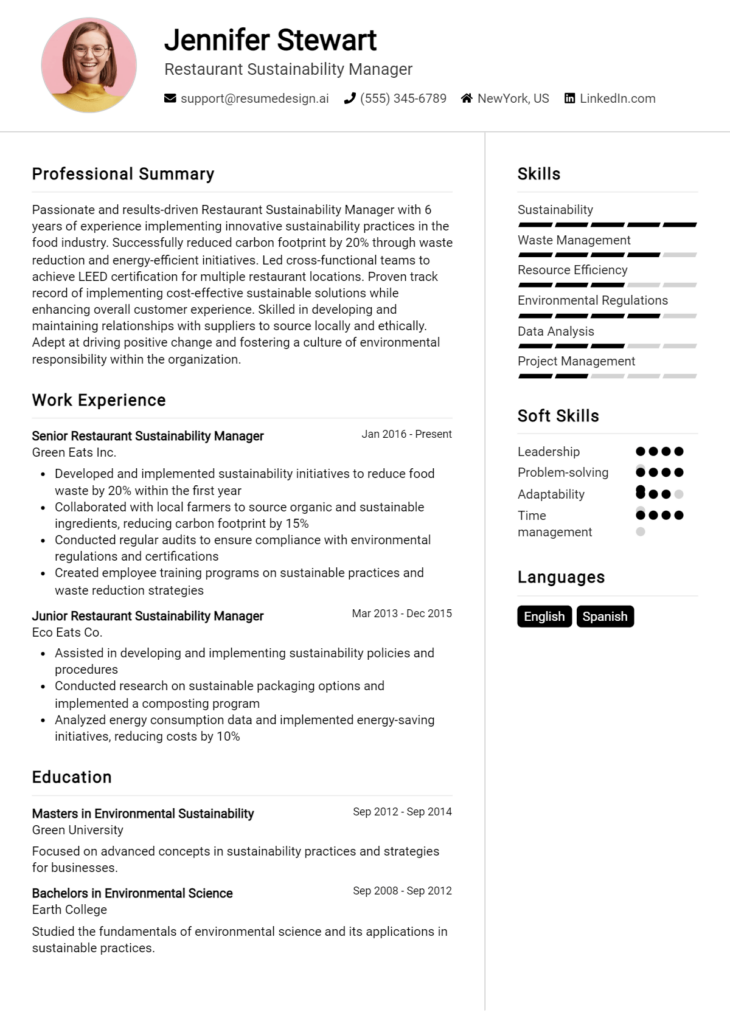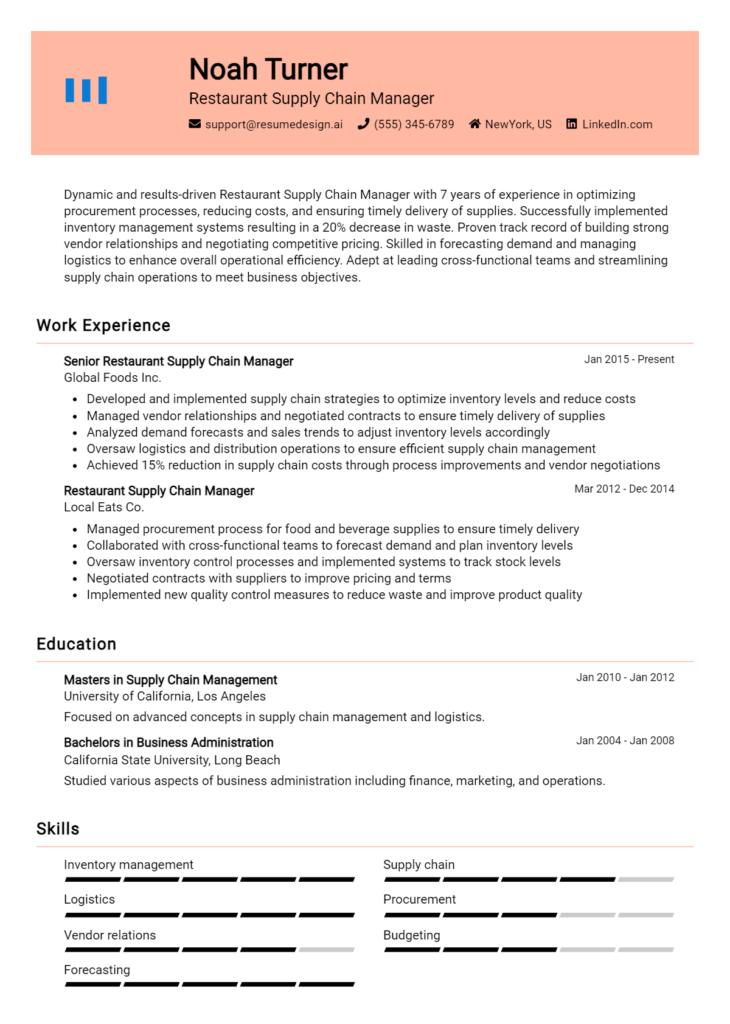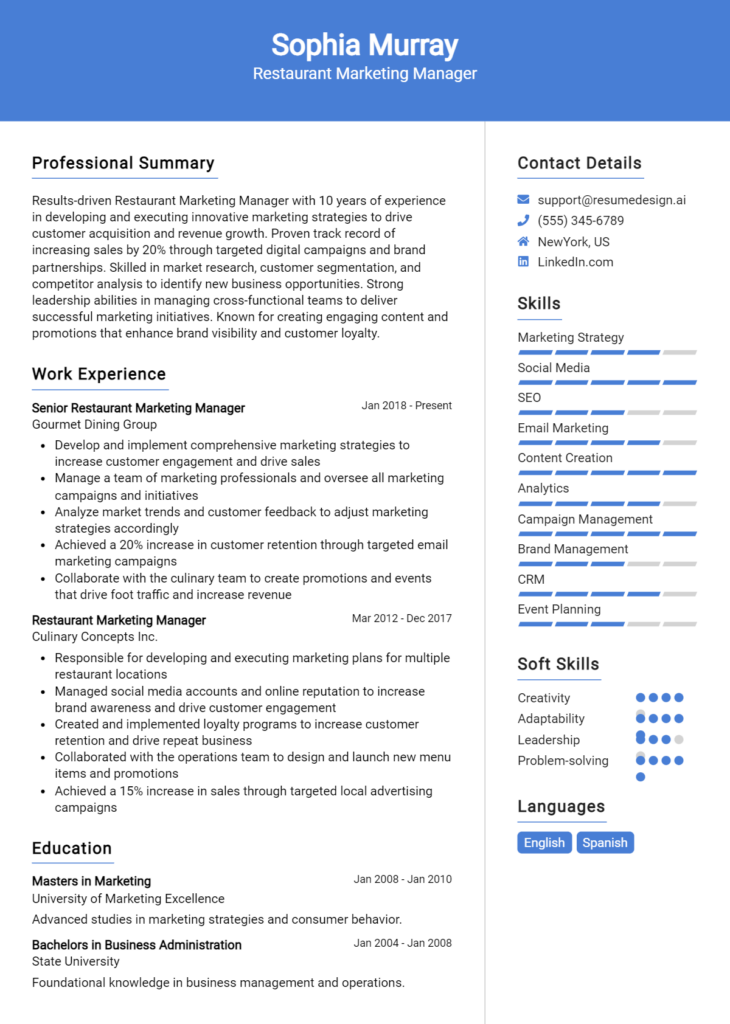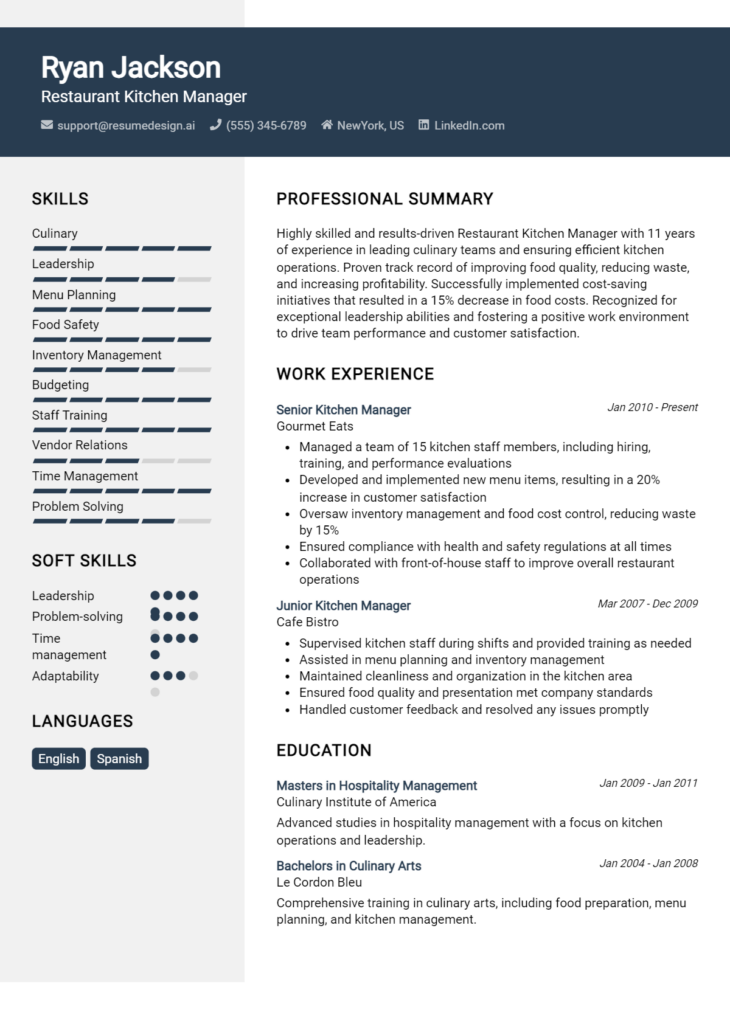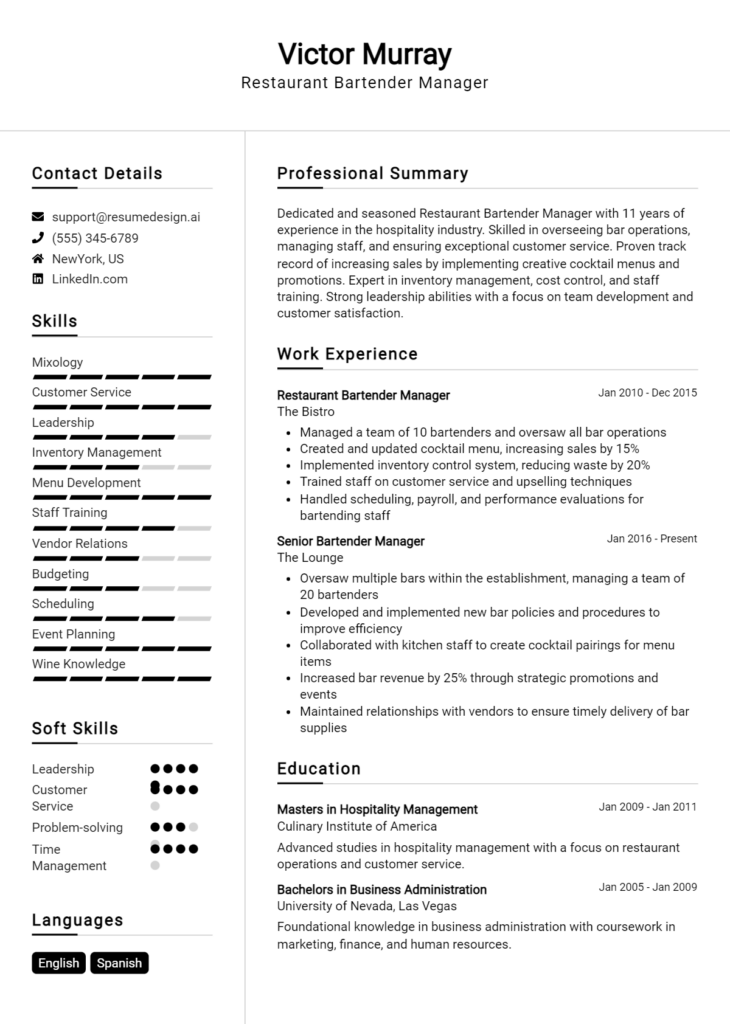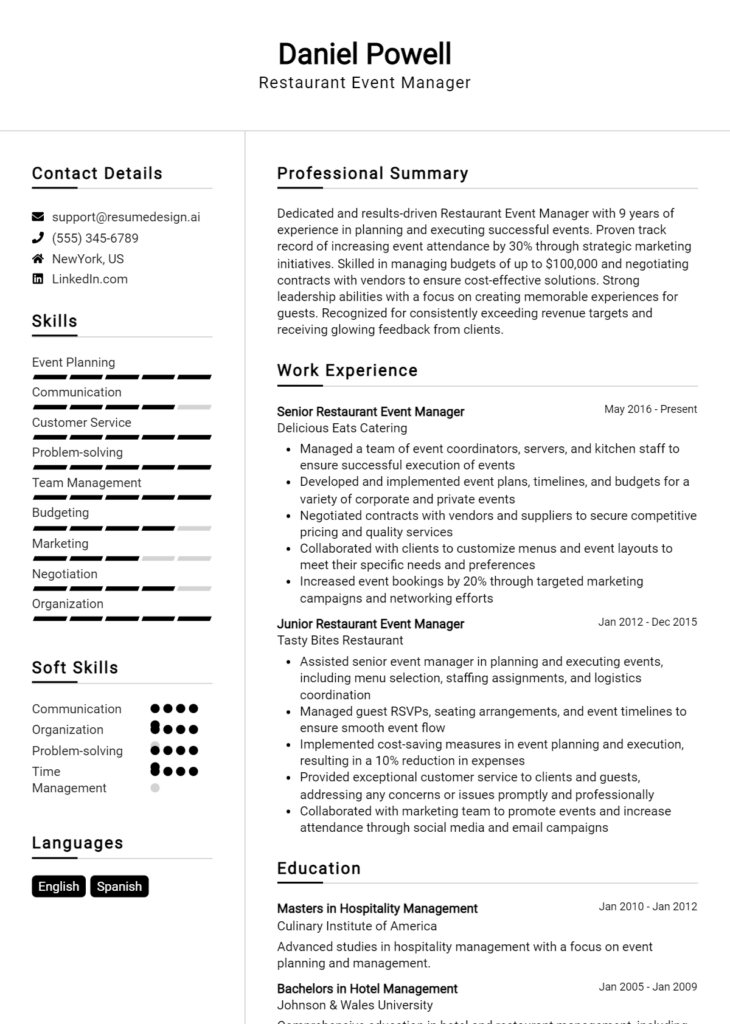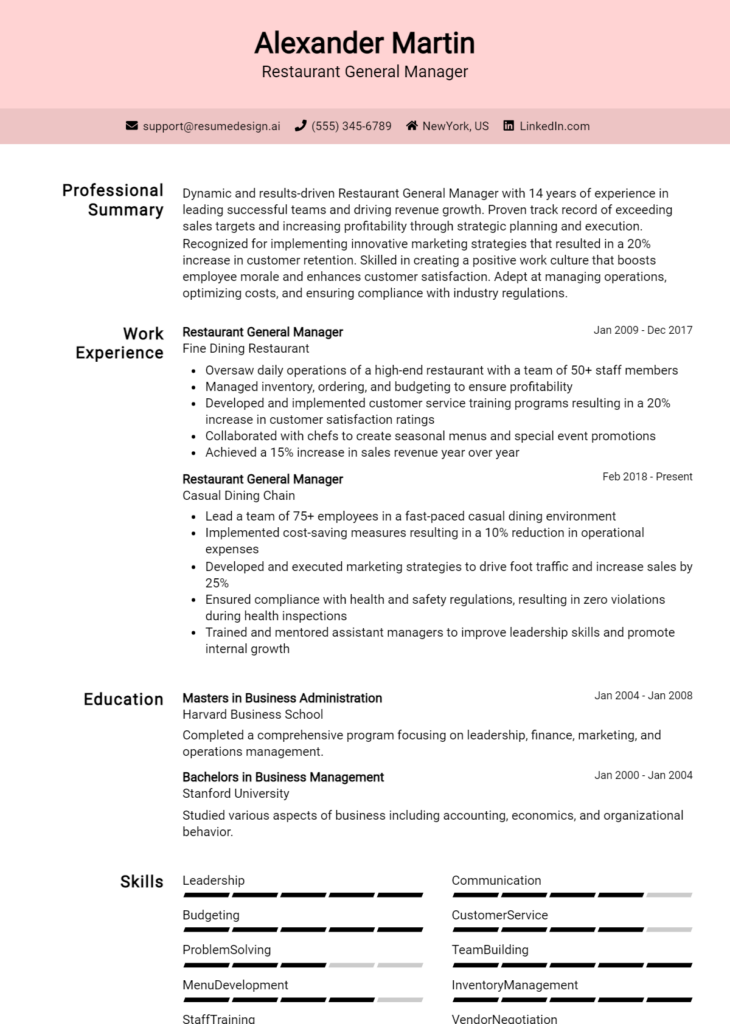Restaurant Operations Manager Core Responsibilities
The Restaurant Operations Manager plays a pivotal role in ensuring seamless coordination between various departments, including kitchen staff, front-of-house operations, and supply chain management. Essential skills include technical expertise in food safety regulations, operational efficiency, and advanced problem-solving abilities to address challenges promptly. By leveraging these competencies, the manager contributes significantly to the organization’s goals, enhancing profitability and customer satisfaction. A well-structured resume can effectively highlight these qualifications, showcasing a candidate's ability to drive success.
Common Responsibilities Listed on Restaurant Operations Manager Resume
- Overseeing daily restaurant operations and staff management
- Implementing and maintaining operational policies and procedures
- Monitoring inventory levels and managing supply chain logistics
- Ensuring compliance with health and safety regulations
- Managing budgets and financial performance analysis
- Training and developing restaurant staff
- Coordinating with marketing to promote the restaurant
- Handling customer feedback and resolving complaints
- Analyzing sales data to identify trends and opportunities
- Collaborating with chefs to design and update the menu
- Planning and executing special events and promotions
- Leading team meetings to communicate goals and updates
High-Level Resume Tips for Restaurant Operations Manager Professionals
In today's competitive job market, a well-crafted resume is essential for Restaurant Operations Manager professionals looking to make a lasting impression on potential employers. Your resume is often the first glimpse hiring managers have of your capabilities, and it must not only showcase your skills but also highlight your achievements in a way that sets you apart from other candidates. A standout resume reflects your understanding of the industry's demands and your ability to manage restaurant operations effectively. This guide will provide practical and actionable resume tips specifically tailored for Restaurant Operations Manager professionals, helping you navigate the process of creating a compelling narrative of your career journey.
Top Resume Tips for Restaurant Operations Manager Professionals
- Tailor your resume to each job description by incorporating relevant keywords and phrases that align with the specific requirements of the position.
- Showcase your relevant experience by emphasizing past roles in restaurant management, operations, or related fields that demonstrate your ability to lead and optimize restaurant performance.
- Quantify your achievements with specific metrics, such as revenue growth percentages, cost reductions, or improvements in customer satisfaction scores, to provide concrete evidence of your impact.
- Highlight industry-specific skills, including knowledge of food safety regulations, inventory management, staff training, and customer service excellence.
- Use action-oriented language that conveys leadership and initiative, such as "implemented," "developed," or "streamlined," to create a more dynamic portrayal of your accomplishments.
- Include a summary statement at the top of your resume that encapsulates your experience and unique value proposition as a Restaurant Operations Manager.
- Make use of bullet points for easy readability, breaking down your responsibilities and achievements into concise, digestible statements.
- Keep your resume to one or two pages, ensuring that all information is relevant and impactful, while eliminating any unnecessary fluff.
- Incorporate professional development activities, such as certifications or training programs, that bolster your qualifications and demonstrate your commitment to the industry.
By implementing these tips, you can significantly enhance your chances of landing a job in the Restaurant Operations Manager field. A well-structured and focused resume not only showcases your qualifications but also communicates your dedication and readiness to contribute to a potential employer’s success. Stand out in the competitive landscape and position yourself as the ideal candidate for the role.
Why Resume Headlines & Titles are Important for Restaurant Operations Manager
In the competitive landscape of the restaurant industry, the role of a Restaurant Operations Manager is crucial for ensuring smooth daily operations, staff management, and customer satisfaction. A well-crafted resume headline or title serves as the first impression for hiring managers, providing a snapshot of the candidate’s key qualifications and expertise. A strong headline can immediately capture attention, summarizing a candidate's strengths in a concise and impactful phrase. This is essential in a fast-paced hiring environment where decision-makers often skim through numerous applications. Therefore, crafting a relevant and focused headline is vital for standing out and making a memorable impression.
Best Practices for Crafting Resume Headlines for Restaurant Operations Manager
- Keep it concise—aim for one impactful phrase.
- Use specific keywords related to the restaurant industry.
- Highlight your most relevant skills or experiences.
- Make it action-oriented, showcasing your achievements.
- Tailor the headline to align with the job description.
- Avoid jargon; use clear and straightforward language.
- Incorporate metrics where possible to quantify experience.
- Stay professional and avoid overly casual language.
Example Resume Headlines for Restaurant Operations Manager
Strong Resume Headlines
Dynamic Restaurant Operations Manager with 10+ Years of Experience in Streamlining Processes and Boosting Sales
Results-Driven Operations Leader Focused on Enhancing Guest Experience and Reducing Turnover
Experienced Restaurant Manager Specializing in Staff Development and Operational Efficiency
Award-Winning Restaurant Operations Manager with Proven Track Record of Increasing Profitability by 30%
Weak Resume Headlines
Manager Looking for a Job
Restaurant Professional
Strong headlines are effective because they immediately convey the candidate's specific strengths and relevant experience, making it easy for hiring managers to see their potential value. They incorporate key industry terms and metrics that resonate with the requirements of the role. In contrast, weak headlines fail to impress because they are vague and generic, lacking any specific information that would help the candidate stand out. By not tailoring the title to the role, candidates miss the opportunity to establish their qualifications right from the start.
Writing an Exceptional Restaurant Operations Manager Resume Summary
A well-crafted resume summary is essential for a Restaurant Operations Manager as it serves as the first impression for hiring managers. This brief yet powerful introduction encapsulates key skills, relevant experience, and notable accomplishments, compelling the reader to delve deeper into the candidate's qualifications. A strong summary should be concise and impactful, tailored specifically to the job being applied for, ensuring that it resonates with the unique requirements and culture of the restaurant. By providing a clear snapshot of a candidate's capabilities, a compelling summary can significantly enhance the chances of securing an interview.
Best Practices for Writing a Restaurant Operations Manager Resume Summary
- Quantify Achievements: Use numbers to highlight your successes, such as revenue growth percentages or cost reductions.
- Focus on Key Skills: Emphasize essential skills like leadership, financial management, and operational efficiency.
- Tailor to Job Description: Customize your summary for each application, aligning your experience with the specific requirements of the role.
- Highlight Relevant Experience: Showcase your years in the industry and any specific roles that directly relate to restaurant operations.
- Use Action-Oriented Language: Start sentences with strong verbs to convey a sense of proactivity and effectiveness.
- Keep It Concise: Aim for 3-5 sentences that convey your most relevant qualifications without overwhelming the reader.
- Showcase Leadership Qualities: Mention your ability to manage teams, drive performance, and foster a positive work environment.
- Incorporate Industry Keywords: Use relevant terminology that reflects your knowledge and experience within the restaurant industry.
Example Restaurant Operations Manager Resume Summaries
Strong Resume Summaries
Results-driven Restaurant Operations Manager with over 10 years of experience in high-volume establishments, achieving a 30% increase in annual revenue through strategic cost reductions and improved operational efficiencies.
Dynamic leader with a proven track record of managing teams of over 50 staff, enhancing customer satisfaction scores by 25% and reducing staff turnover by 15% through effective training and development programs.
Highly skilled in financial management and inventory control, successfully streamlined operations to reduce food waste by 20%, resulting in annual savings of $100,000 while maintaining exceptional quality standards.
Weak Resume Summaries
Experienced in restaurant management and operations. I am looking for a new opportunity.
Skilled manager with a background in the food industry. I have worked in various positions and am open to new challenges.
The strong resume summaries are effective because they provide specific, quantifiable achievements and clearly outline relevant skills and experiences tailored to the role of a Restaurant Operations Manager. They demonstrate a clear understanding of the job's demands and highlight the candidate's ability to deliver results. In contrast, the weak summaries lack detail and specificity, failing to convey the candidate's unique qualifications or accomplishments, making them less compelling to hiring managers.
Work Experience Section for Restaurant Operations Manager Resume
The work experience section of a Restaurant Operations Manager resume is crucial as it serves as the primary evidence of a candidate's competencies in managing restaurant operations effectively. This section not only highlights the candidate's technical skills, such as knowledge of food safety regulations, inventory management, and customer service excellence, but also showcases their ability to lead and motivate teams to achieve high standards of performance. Additionally, by quantifying achievements—such as increased revenue, reduced costs, or improved customer satisfaction ratings—candidates can illustrate their impact in previous roles. Aligning this experience with industry standards further emphasizes a candidate's suitability for the position.
Best Practices for Restaurant Operations Manager Work Experience
- Use action verbs to describe your responsibilities and achievements.
- Quantify your outcomes with specific metrics (e.g., percentage increases in sales, customer satisfaction scores).
- Highlight your technical skills relevant to restaurant operations, such as POS systems, inventory management software, and compliance procedures.
- Showcase leadership experiences, including team management, training, and conflict resolution.
- Emphasize collaboration with other departments, such as marketing and catering, to drive overall business success.
- Tailor your experiences to match the job description, emphasizing relevant skills and achievements.
- Include awards, recognitions, or certifications that reinforce your qualifications and industry expertise.
- Maintain a clear, concise format that is easy for hiring managers to read and digest.
Example Work Experiences for Restaurant Operations Manager
Strong Experiences
- Increased annual sales by 25% through the implementation of a new marketing strategy and seasonal menu updates, resulting in a 15% rise in customer foot traffic.
- Reduced food waste by 30% by optimizing inventory management practices and conducting regular staff training on portion control and food handling.
- Led a team of 20 staff members, fostering a collaborative culture that improved staff retention by 40% and enhanced overall customer service ratings to 4.8/5.
- Successfully managed a $1M budget, achieving a 10% reduction in operating costs while maintaining quality and service standards.
Weak Experiences
- Responsible for managing daily operations in the restaurant.
- Worked with staff to improve service.
- Handled customer complaints and made sure they were resolved.
- Helped with inventory and ordering supplies.
The examples of strong experiences illustrate specific, quantifiable achievements and demonstrate effective leadership and technical expertise, which are essential for a Restaurant Operations Manager role. They focus on measurable outcomes and clearly describe the candidate's direct contributions to the restaurant's success. Conversely, the weak experiences lack specificity and fail to convey the impact of the candidate’s actions, making it difficult for hiring managers to assess their qualifications and effectiveness in previous roles.
Education and Certifications Section for Restaurant Operations Manager Resume
The education and certifications section of a Restaurant Operations Manager resume is crucial for demonstrating the candidate's academic background and commitment to professional development. This section not only showcases relevant degrees and industry-recognized certifications but also highlights the candidate's dedication to continuous learning—a key attribute in the dynamic food service industry. By providing details about pertinent coursework, certifications, and specialized training, candidates can significantly enhance their credibility and align their qualifications with the specific demands of the role they are applying for.
Best Practices for Restaurant Operations Manager Education and Certifications
- Include degrees from accredited institutions that relate directly to hospitality or business management.
- Highlight industry-relevant certifications, such as ServSafe or Certified Restaurant Manager (CRM).
- List specialized training programs that pertain to restaurant operations, such as inventory management or customer service excellence.
- Provide relevant coursework that showcases knowledge in financial management, food safety, and operational efficiency.
- Use clear and concise language to describe each credential and its relevance to the role.
- Prioritize the most recent and advanced certifications to demonstrate ongoing professional development.
- Consider including professional affiliations, such as membership in the National Restaurant Association.
- Ensure the formatting is consistent and easy to read, making it simple for hiring managers to identify key qualifications.
Example Education and Certifications for Restaurant Operations Manager
Strong Examples
- Bachelor of Science in Hospitality Management, University of XYZ
- ServSafe Food Safety Certification, National Restaurant Association
- Certified Restaurant Manager (CRM), American Culinary Federation
- Coursework in Restaurant Financial Management, ABC Community College
Weak Examples
- Associate Degree in General Studies, Unknown Institution
- Certificate in Basic Cooking Skills, 1998
- High School Diploma, Anytown High School
- Certification in Office Management, Outdated Program
The strong examples demonstrate relevant educational background and certifications that directly support the responsibilities of a Restaurant Operations Manager, showcasing specialized knowledge and ongoing professional development. In contrast, the weak examples reflect qualifications that are either irrelevant to the role or outdated, which do not effectively highlight the candidate's suitability for the position in the current competitive market.
Top Skills & Keywords for Restaurant Operations Manager Resume
A well-crafted resume for a Restaurant Operations Manager should highlight a blend of essential skills that showcase both leadership and operational expertise. These skills are critical not only to attract the attention of hiring managers but also to demonstrate the candidate's ability to enhance the overall efficiency, profitability, and customer satisfaction within a restaurant environment. By emphasizing relevant skills, candidates can effectively communicate their qualifications and experience, making their resumes stand out in a competitive job market. For more insights on how to present your qualifications, consider exploring skills and work experience.
Top Hard & Soft Skills for Restaurant Operations Manager
Soft Skills
- Leadership
- Communication
- Problem-solving
- Teamwork
- Time management
- Customer service orientation
- Flexibility
- Conflict resolution
- Adaptability
- Interpersonal skills
- Decision-making
- Organizational skills
- Attention to detail
- Empathy
- Multitasking
- Stress management
- Negotiation skills
- Initiative
Hard Skills
- Inventory management
- Budgeting and forecasting
- Point of sale (POS) systems proficiency
- Food safety regulations
- Staff training and development
- Menu planning
- Quality control
- Cost control and analysis
- Scheduling and labor management
- Marketing strategies
- Supply chain management
- Data analysis
- Compliance with health and safety standards
- Financial reporting
- Knowledge of culinary techniques
- Restaurant design and layout planning
- Technology integration in operations
- Procurement and vendor management
Stand Out with a Winning Restaurant Operations Manager Cover Letter
Dear [Hiring Manager's Name],
I am writing to express my interest in the Restaurant Operations Manager position at [Restaurant Name], as advertised on [Job Board/Company Website]. With over [X years] of experience in the restaurant industry, I have honed my skills in operations management, team leadership, and customer service excellence. My passion for creating outstanding dining experiences, combined with my strategic approach to operational efficiency, makes me a strong candidate for this role.
In my previous position as Operations Manager at [Previous Restaurant Name], I successfully oversaw daily operations, implemented cost-control measures, and enhanced overall guest satisfaction ratings by [X%] through staff training and engagement initiatives. I believe that a well-trained team is the backbone of any successful restaurant, and I take pride in fostering a positive work environment where employees feel valued and empowered to deliver exceptional service. My ability to analyze performance metrics and streamline processes has consistently resulted in improved operational efficiency and profitability.
I am particularly drawn to [Restaurant Name] because of its commitment to [specific value, mission, or unique aspect of the restaurant]. I am excited about the opportunity to bring my expertise in developing operational strategies and enhancing customer experiences to your team. I am confident that my proactive approach and dedication to excellence will contribute positively to [Restaurant Name]'s continued success.
Thank you for considering my application. I look forward to the possibility of discussing how my background, skills, and enthusiasm align with the goals of [Restaurant Name]. I am eager to bring my expertise in restaurant operations management to your esteemed establishment and help drive its success.
Sincerely,
[Your Name]
[Your Phone Number]
[Your Email Address]
Common Mistakes to Avoid in a Restaurant Operations Manager Resume
Crafting a compelling resume as a Restaurant Operations Manager is crucial in a competitive job market. However, many candidates make common mistakes that can undermine their chances of landing an interview. Avoiding these pitfalls can enhance your resume's effectiveness and showcase your qualifications more clearly. Here are some common mistakes to steer clear of:
Using a Generic Template: A one-size-fits-all resume fails to highlight your unique skills and experiences. Tailor your resume for each application to reflect the specific requirements of the role.
Neglecting Quantifiable Achievements: Focusing solely on responsibilities rather than accomplishments can weaken your resume. Include specific metrics, such as revenue growth, cost reductions, or customer satisfaction improvements, to demonstrate your impact.
Overloading with Jargon: While industry-specific terms can showcase your expertise, excessive jargon may alienate hiring managers. Strive for a balance that conveys professionalism without overwhelming the reader.
Ignoring Formatting Consistency: A cluttered or inconsistent format can distract from your content. Use clear headings, bullet points, and uniform font sizes to create a polished and easy-to-read document.
Failing to Highlight Leadership Skills: As an Operations Manager, leadership is critical. Ensure that your resume emphasizes your ability to lead teams, train staff, and manage conflicts effectively.
Omitting Relevant Certifications: Certifications such as ServSafe or other management credentials can set you apart. Make sure to include any relevant licenses or training that enhance your qualifications.
Listing Duties Instead of Skills: Simply listing job duties does not convey your capabilities. Focus on highlighting key skills, such as budgeting, inventory management, and customer service excellence, that align with the expectations of the role.
Neglecting to Proofread: Spelling and grammatical errors can create an unprofessional impression. Review your resume multiple times and consider having someone else proofread it to catch any mistakes.
By sidestepping these common mistakes, you can create a resume that accurately reflects your expertise and positions you as a strong candidate for the Restaurant Operations Manager role.
Conclusion
In this article, we explored the essential responsibilities and skills required for a Restaurant Operations Manager. Key points included the importance of overseeing daily operations, managing staff, ensuring customer satisfaction, and maintaining financial performance. We also highlighted the need for strong leadership, communication skills, and the ability to adapt to a fast-paced environment.
As you reflect on the insights provided, now is the perfect time to review your Restaurant Operations Manager Resume. Make sure it effectively showcases your experience and skills in alignment with industry standards. To assist you in this process, consider utilizing various tools available online. You can find professionally designed resume templates that can help you create a polished document. If you're looking for a more guided approach, try the resume builder that offers customizable options to fit your unique qualifications.
Additionally, explore resume examples for inspiration and to understand what makes a standout resume in this competitive field. Don’t forget to complement your resume with a compelling cover letter; check out the cover letter templates available to help you make a strong first impression.
Take the next step in your career by ensuring your application materials are top-notch!

